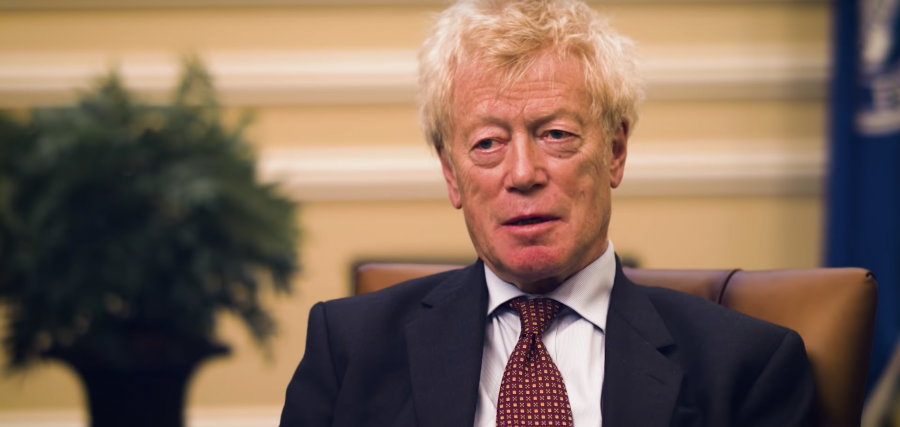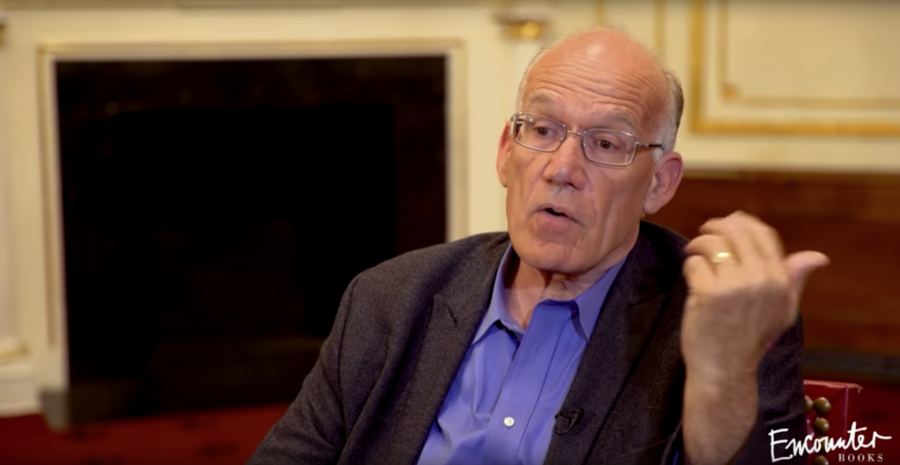For Encounter Books’ “Close Encounters” video interview series, I spoke with Sir Roger Scruton on political unrest in the West and its historical context, the puritanical nature of progressivism and attempts by its adherents to stifle dissent, the imperative to defend free speech and much more.
Tag: Encounter Books (Page 1 of 2)
For Encounter Books I recently had the opportunity to interview the eminent Professor Leon Kass on his latest book Leading a Worthy Life: Finding Meaning in Modern Times.
During the interview [audio, transcript], Professor Kass and I discussed among other things how one defines a “worthy life,” finding meaning in this modern libertine (though often not libertarian) age, the decline but potential for rebirth of core values and principles of Western civilization, squaring scientific progress with ethics, rekindling a love of excellence and much more.
In connection with the release of Encounter Books’ Vox Populi: The Perils and Promises of Populism, I interviewed the author of one its more provocative essays, the often-contrarian and always-compelling Professor Victor Davis Hanson.
During our discussion we discuss among other things:
- The populism of President Trump
- The insights President Trump has into the American people that his political opponents lack
- The significance of the 2016 presidential election in history and what it augurs for the world
- Whether Trumpism is a full-blown political movement or an outlier in U.S. history
- How Trump is doing when it comes to constructing the four core pillars of Trumpism
- Russiagate and Deep State subversion
- And much more
You can listen to our interview in full here, and read a transcript of our discussion here.
On behalf of Encounter Books, recently I had the chance to interview Joy Pullman on her new book, The Education Invasion: How Common Core Fights Parents for Control of American Kids
One particularly interesting portion of our conversation comes in the form of Joy’s argument about Common Core serving as in effect an extension of the administrative state:
Ben Weingarten: And you, early on in your book, describe Common Core, and a bone that you have to pick with Common Core about consent of governed issues. You write, and I quote, that “Common Core is as big a change in education as Obamacare is in health care, but unlike Obamacare it needed no votes in Congress to become national policy. It garnered practically no notice from the media before the Obama administration, in concert with largely unelected state bureaucrats and a shadow bureaucracy of private organizations, locked it in nationwide. That meant no public debate before the scheme was imposed upon a country supposedly run with the consent of the governed.” And in reading that, is it fair to think of Common Core as, in essence, an extension of the administrative state?
Joy Pullmann: Absolutely. Absolutely…You hit on one of my favorite topics — I should say, my most hated topics, therefore about which I like to rant the most. But absolutely. Common Core, I think, is basically an expression of the administrative state. And what the administrative state is is a vast, unaccountable, unelected bureaucracy that, because it isn’t accountable, Americans who pay the salaries of all these people cannot fire them, cannot tell them what to do, so on and so forth. And they unite all the faculties of the three branches, the executive, the legislative, and the judicial, very often. So it’s a very un-American system of government that has grown up in this country and that we are now governed by, and Common Core is a representation of that.
Ben Weingarten: How did a curriculum that was euphemistically described as state-led actually become advanced through a combination of big business and big government to essentially nationalize education in America?
Joy Pullmann: Basically through the administrative state.
Let me just hit a couple of the major milestones. In my book, I go through a history of what is called the “standards movement” in education because American education has actually been notably declining since the 1950s. And there have been lots of different measures that people have objectively shown to be the case.
And so, ever since then, Americans have been…Politicians, interest groups, and the like have been proposing ways to remedy this problem. And basically, what we keep doing is…The title of another book by American Enterprise Institute scholar, Frederick Hess, The Same Thing Over and Over. So we keep basically enacting the same principles since the 1950s, and expecting a different result. And then we’re shocked when the result of increased centralization is worse inefficiency, higher costs, and stupider children.
Anyway, if we’re gonna talk about “How did all of this happen?”…I talk in my book, there’s documentation to show that enacting Common Core was deliberately facilitated through non-elected, private, special interest groups in order to give it the appearance of being state-led because in previous attempts at nationalizing American education directly through Congress, the American people rejected it soundly. They just failed.
And so the people for whom that is a policy priority said…And I quote, and I cite these folks in my book, they said, “Well, Americans, basically they’re too dumb to know what’s good for them. They don’t like the idea of Washington running their local schools. And in fact, Americans still don’t like the idea of Washington running their local schools. National polls continue to show that.”
“So, since Americans are so parochial and not really informed of their best interest to have an education czar running their local schools from Washington, we’re going to do it on their behalf and in their name through a coalition of private interest groups.”
And that’s exactly how Common Core went into place.
There’s three organizations that came together to create Common Core, and they are creatures of the administrative state. They are technically nonprofit organizations, but in the book, I go through their tax returns. They receive a very large amount of money from federal and state taxpayers through both dues and government contracts. They’re quasi-government — they’re basically government sponges. And so these organizations, which have no legal authority — nobody elected them — no Constitution, no law says that they are in charge of education policy anywhere, nevertheless, they took it upon themselves to get together and create Common Core.
And they did this with funding from the Gates Foundation, which, I’ve just been re-running the numbers again, updating them since the book came out, and I think in the book we have a quarter of a billion dollars that Gates spent on enacting and pushing Common Core, and that has increased to a third of a billion dollars, more than $300 million.
So with that money, these three organizations got together, again, a bunch of unelected people to basically write Common Core. They farmed out little pieces of it to committees. They had a long, complicated, drawn-out process.
But the important thing to me, like you mentioned earlier, is the consent part of it. Because this was done in private organizations instead of a state house, instead of Congress, the American people have no right of transparency. Even though we paid for Common Core to be created in part, and even though we have to live under its regime in our public schools, we still don’t know who paid for what, who wrote what words of Common Core, what their credentials are, who vetted it. All of this is opaque. It’s not subject to Freedom of Information, Sunshine Law sorts of requirements.
This is actually really common in public policy nowadays, as you mentioned, because government has gotten so big that it’s very, very difficult, if not impossible, for anyone to watchdog it. You would have to have investigative reporters who cared more about uncovering what government is doing in the name and with the money of the people, than they do about running flippy stories about the Kardashian family or whatever.
Anyway, so they created it, and then they went directly to the Obama administration which Congress had, in all its wisdom, given basically a strings-free pot of money for the education department. And Gates Foundation officials had phone calls, regular check-up phone calls with Obama administration officials, and they put into place this scheme by which they would bribe all the states into it. It was called Race to the Top.
So the Obama administration, during the panic years of 2008 and 2009, when we were having an economic crisis, went to the states and said, “Hey, you might be able to win a couple of hundred thousand, maybe a million dollars from the federal government for education projects, as long as you do all these things to make us happy for a shot at it.” Mind you, a couple hundred thousand dollars or a million dollars sounds like a lot to you and me, we could be set for life if we had that money, but in terms of education funding, it’s a drop in the bucket.
So states were coming to the federal government, hat in hand, to get less than one percent of their annual education funding for a one-time-only program that committed them to much more spending than they got out of it. And only a handful of states ended up being winners anyway.
One of the criteria for just applying for this program included adopting standards that are common to a majority of states, standards being mandates for what tests and curriculum have to contain. And of course the only thing that fit that definition was Common Core. And in fact, Common Core itself was in the original draft regulations that the Obama administration wanted to put out, but at the last minute they changed it to a definition that only fit Common Core, without mentioning it because they were afraid of the political backlash.
Obviously it’s long and complicated, and there’s lots of other things, but those are basically the milestones. The milestones are created under the auspices of private organizations that nobody can see what they’re doing, even though taxpayers pay for their activities. And then second, the Obama administration comes to states, holds a carrot in front of their little noses and says, “Come get it, little donkeys,” and they all came running.
The kicker to me is that the state signed contracts with the federal government, promising that they would do a complete overhaul of all their curriculum and testing, and this was all before even a draft of Common Core was available. They had no idea what they were going to have kids learning in schools. They had no idea what the tests would look like. And they still said, “Sure, sounds good to me. We believe that whatever you promise is gonna come through.” To me that’s unconscionable. It’s completely an abdication of the responsibility of public officials.
You can read the transcript in full here.

Check out my interview on behalf of Encounter Books with Professor Barry Latzer in connection with his newly released The Rise and Fall of Violent Crime in America.
During the interview, which you can listen to below, Prof. Latzer and I discuss a range of topics including Latzer’s difficulty in publishing a book that talks about the correlation between violent crime and race, the link between war and crime, the interesting theory of the inverse relationship between homicide and suicide rates, the surprising lack of correlation between economics and crime, what caused the spike of crime from the late 1960s through the early 1990s and the drastic plummet of rates from the late 1990s to today, the deep question of whether crime is attributable to economics or culture, and what the future of violent crime looks like in America:
Featured Image Source: Karl Merton Ferron, Baltimore Sun.

I recently had the opportunity to speak at length with Republican Presidential candidate Sen. Ted Cruz’s national security and foreign policy brain trust, Dr. Victoria Coates, on behalf of Encounter Books in connection with the release of her intellectually stimulating and compelling new David’s Sling: A History of Democracy in Ten Works of Art.
During our extensive interview — which you can listen to in full or in parts per the below — we discuss the indelible link between democracy and creativity, the significance of great works of art and architecture in the history of freedom from Michelangelo’s David to the Parthenon and Picasso’s Guernica, why the entrepreneurial art community endorses political stances anathema to the freedom that sustains it, and everything you would ever want to know about Sen. Ted Cruz’s foreign policy vision. On this latter point, among other subjects, Dr. Coates and I discuss the principles that form the Cruz Doctrine, who in the foreign policy sphere truly carries the mantle of Jeanne Kirkpatrick, what “winning” in the Middle East would look like for America under a President Cruz, Saudi Arabia vs. Iran, whether America has a responsibility under NATO to defend an Islamic supremacist Turkish regime against Russia, how a President Cruz would handle an ascendant Russia, the long-term threat posed by China and how to counter her, the greatest threat to America’s national interest we are most underestimating or ignoring, and much more.
You can also read the transcripts to both parts of our interview here (Part I on David’s Sling) and here (Part II on Foreign Policy/National Security.
Check out my interview on behalf of Encounter Books with Pacific Research Institute President Sally Pipes in connection with her newly released broadside The Way Out of Obamacare.
During the interview, which you can listen to below, Sally and I discuss the current and future perils awaiting America’s healthcare system under President Obama’s signature piece of legislation, how progressive healthcare policy has caused regressive consequences, what “single-payer” healthcare looks like and why Ms. Pipes thinks we are headed down that road, the Pipes plan to fix America’s healthcare system, her cameo in Michael Moore’s “Sicko” and much much more:






